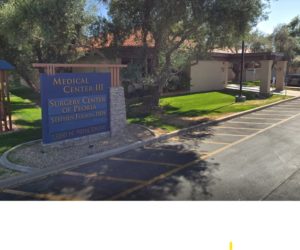Arizona Court Decisions Affirm Two Medical Professional Liability Reform Laws

The Arizona courts made two decisions in August 2021 affirming the constitutionality of medical professional liability tort reforms that require expert testimony and preclude statements of apology by healthcare providers from being used as evidence of liability.
In Sampson v. Surgery Center of Peoria, LLC, the Supreme Court of Arizona held that “a jury in a medical malpractice case may not be left to ‘infer’ causation without the guidance of expert testimony where the cause of death is disputed and not obvious to an ordinary person.”
The underlying case involved the 2012 death of Amare Burks, a four-year-old boy, who underwent an outpatient tonsillectomy and adenoidectomy at Surgery Center of Peoria. The surgery was performed under general anesthesia and Burks was discharged an hour post-procedure. Two hours later, his mother found him unresponsive and he could not be revived. Burks’ mother, Michelle Sampson, filed a lawsuit alleging malpractice.
Sampson’s expert witness testified at trial that one hour was insufficient to assess a pediatric patient for discharge, arguing the standard of care required up to three hours of post-operative observation. He alleged Burks’ death could have been prevented with longer observation in the Post-Anesthesia Care Unit. He also testified Burks died from being rendered unable to breathe from the after-effects of surgery and anesthesia, as his pharyngeal tissues were swollen and obstructed his upper airway, and the residual effects of anesthesia did not allow him to awaken to overcome the obstruction.
Surgery Center of Peoria moved for summary judgment, arguing that the plaintiff’s standard-of-care expert failed to demonstrate that its actions proximately caused the boy’s death. Plaintiff countered that causation was “obvious” and thus no expert causation testimony was needed. The trial court agreed with the defense, granting summary judgment, finding that Sampson’s expert witness failed to state a causal connection between the Surgery Center’s actions and omissions and Burks’ death, and that whether Burks would have survived with longer observation involved “matters committed to the expertise of medical practitioners, and well beyond the ken of the average juror.” Sampson appealed the ruling.
The Court of Appeals reversed the trial court’s ruling, articulating the baseline principle that “[c]ausation in a medical malpractice action must be proved by expert testimony unless the connection between the conduct and the injury is readily apparent.”
The appeals court concluded that “[w]hile expert testimony on causation is often necessary, we perceive no such necessity here.” Acknowledging that the testimony from the plaintiff’s expert witness was “varying widely” between one and three hours of observation, the court determined that “a reasonable jury could nonetheless find that the standard of care for observation was three hours.” And if it did, the jury “could properly infer that the early discharge was the probable cause of [Burks’] death.” Surgery Center of Peoria appealed the ruling.
The Arizona Supreme Court granted review to determine whether the Court of Appeals erred by holding that the jury could properly infer proximate cause under the facts presented. It concluded the appeals court had misjudged, vacating the lower court’s decision, and ordered summary judgment be reinstated.
In its decision, the court noted that the plaintiff’s expert witness “equivocated over the applicable standard, providing a range from one hour of post-operative observation, which the Surgical Center satisfied, to up to three hours, which it did not. More significantly, [the expert] did not opine that insufficient observation was the probable proximate cause of [Burks’] death. Rather, he opined that greater observation ‘could have’ allowed Surgery Center personnel to resuscitate [Burks].”
Thus, even if the expert witness “testimony regarding causation is generously read to require a three-hour observation period, his failure to connect the dots between the premature discharge and [Burks’] death would leave the jury to infer that Surgery Center’s failure to observe was the proximate cause. “Such causation must be shown to be [p]robable and not merely [p]ossible, and generally expert medical testimony that a subsequent illness or disease ‘could’ or ‘may’ have been the cause of the injury is insufficient.”
In a separate case, the Arizona Court of Appeals determined the state’s “I’m Sorry” statute precluding a healthcare provider’s statements of apology, responsibility, condolence or compassion from being admitted as evidence during a medical malpractice trial is constitutional.
At issue in Coleman v. Amon was whether the apology statute violates the Arizona Constitution’s separation of powers, prohibition against special laws, and prohibition against privileges and immunities clauses.
According to the appellate court decision, the apology statute does not violate these clauses because the statute is substantive rather than procedural, serves a legitimate government interest of encouraging healthcare providers to be more candid and empathetic with patients, and applies uniformly to all members of the classes of healthcare providers and persons suing them.

